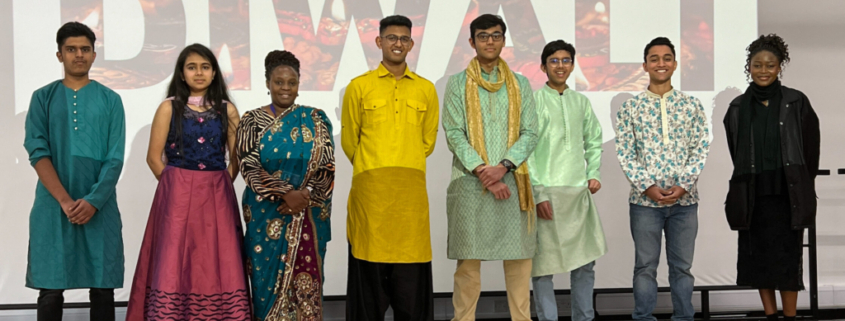Diwali: Sixth Formers Share This Festival Of Lights
 Diwali is a significant festival that is celebrated by millions of people around the world, particularly those of the Hindu and Sikh faiths. The festival, which usually falls in October or November each year, is celebrated over a period of five days and is known as the “Festival of Lights”. Earlier this month, Mrs Ndagire and Sixth Formers, Avni, Sid, Sash, Shubham, Ayush, Vipul, Aadi and Ani spoke to our Year 12 and Year 13 about the importance of this festival that celebrates India’s diverse cultural heritage. They explained the festival’s traditions and the significance of each day during Diwali. You can read Aadi’s speech in full below.
Diwali is a significant festival that is celebrated by millions of people around the world, particularly those of the Hindu and Sikh faiths. The festival, which usually falls in October or November each year, is celebrated over a period of five days and is known as the “Festival of Lights”. Earlier this month, Mrs Ndagire and Sixth Formers, Avni, Sid, Sash, Shubham, Ayush, Vipul, Aadi and Ani spoke to our Year 12 and Year 13 about the importance of this festival that celebrates India’s diverse cultural heritage. They explained the festival’s traditions and the significance of each day during Diwali. You can read Aadi’s speech in full below.
The name “Diwali” means “rows of lighted lamps” which are lit during the festival. It is a very important holiday in India, representing new beginnings, the triumph of good over evil and light over darkness. It’s a time to embrace positive values such as kindness, togetherness, empathy and understanding. Mrs Ndagire spoke of how we can all try to adopt these values in our daily lives and of how small acts of kindness can make a big difference and help us all lead happier and more fulfilling lives.
Aadi’s Speech
“Diwali, transcends cultural and regional boundaries, embodying a universal celebration of light prevailing over darkness. This five-day Hindu festival holds a special place, emphasising unity in diversity as different regions infuse their unique customs into the celebration. The festival is a vibrant tapestry of traditions, from the ritualistic oil massages symbolising the triumph of good over evil to the heartfelt offerings made to ancestors.
The significance of each day during Diwali adds depth to the celebration. The second day, Narak-Chaturdashi, commemorates the legend of Lord Krishna slaying the demon Narakasura, leading to a tradition of jubilation. The third day, marked by the new moon, is auspicious for expressing gratitude to ancestors and worshipping Lakshmi, the goddess of wealth and prosperity. This day also serves as the beginning of the new year for some Hindu calendars.
Bali-Pratipada, the next day, symbolises love between husband and wife. It is a day for newly married daughters to be welcomed with special meals and gifts. This auspicious occasion is considered the commencement of the Hindu New Year (in some traditions), marked by the initiation of new ventures, house-warming ceremonies, and even purchases of gold, silver, or property.
The last day of Diwali, Bhai-Dooj, is a poignant celebration of the bond between brothers and sisters. Sisters apply tilak (red vermillion) on their brother’s forehead, wave aarti, and offer sweets, while brothers reciprocate with loving presents. Even those without brothers partake in a puja to the Moon God (Chandra).
Diwali also encompasses profound spiritual episodes in other religions, such as Mahavira attaining Nirvana in Jainism and the victory of Guru Hargobind from the designs of Mughal Emperor Jahangir, who had imprisoned him and 52 other princes with him, in Sikhism. These events bridge the rich traditions of Diwali with the spiritual heritage of modern times, creating a festival that resonates with both cultural and spiritual significance. ”
Aadi Gautham Kamath




